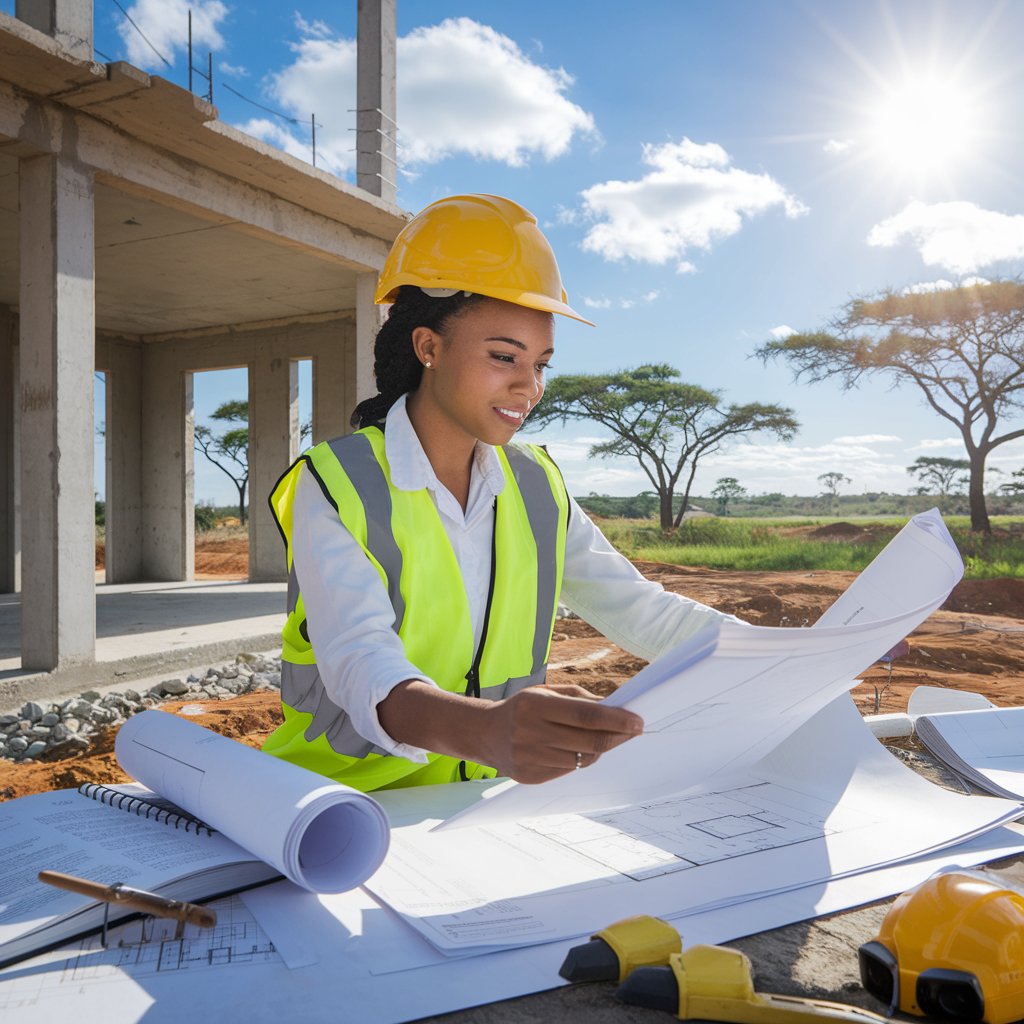MISHub QI
Women in Civil Engineering: Academic and Professional Challenges for Students and Recent Graduates in Mozambique
Women in Civil Engineering: Academic and Professional Challenges for Students and Recent Graduates in Mozambique
The aim of this interview is to understand the challenges faced during training and early careers, the interaction in the professional environment, the preferences between field and office work, and the strategies they use to overcome barriers. This interview aims to highlight the growing female participation in the sector and inspire future generations.
In your experience during your internship or practical work, how were you received by your teams? Did you feel that there were additional challenges because you were a woman?
Yara Raviua: " Well, during my practical work experience, I was well received, thank God! I faced additional challenges because I am naturally a woman, since the civil engineering course is a profession in which the female population is still smaller in the sector's positions, the work teams underestimated my skills, especially in climbing scaffolding and scaling heights."
"My experience during the internship and during the practical work was very positive. Thank God, the teams I worked with were always receptive, and I didn't face any major difficulties in adapting to a predominantly male environment.
However, being one of the few women, this inevitably created a certain amount of pressure and attracted attention from colleagues. In a society still marked by sexist attitudes, I sometimes heard comments about how women were "lazy" or "didn't like to work", especially after marriage.
The curious thing is that there was no doubt about my technical ability, after all, my presence there was already proof that they believed in my competence. The doubt seemed to be focused on the future, on how long I would resist before adapting to the traditional role of a housewife supported by her husband.
Although this is not my case (not being married), this situation created insecurity, and I felt pressured to do my best to avoid judgment and not compromise professionalism."
Nicolle Mapulango: " No, thank God I was interning at a company where 60% of the employees are female, so there were no challenges."
When you think about your future in civil engineering, do you prefer to spend more time in an office developing projects or do you prefer to interact directly with the site, monitoring the execution of the works? Why?
Yara Raviua: " I initially worked in the office and I noticed that the office environment tends to be more controlled, without the unexpected events and challenges that arise directly on the construction site, making the routine more predictable. To be honest and truthful, I prefer direct interaction with the field, as it has been an enriching experience for me. Monitoring the execution of works on the ground gives me a broader view and having access to the results of my work in practice on site is also an extremely rewarding experience."
"I am currently working on project development, but I would like to have more interaction with the field and be part of a construction management team. I find practical experience on site very interesting, and if I had the opportunity, I would work for a few years in the field to gain experience.
However, my preference is for developing projects. I really enjoy the creative side of things; sitting down, analyzing and developing solutions to problems is something that motivates me a lot. Furthermore, working on projects allows me to deal with a greater variety of challenges, since in one year it is possible to develop several different projects. In the field, however, depending on the size of the project, you can spend years working on a single project."
Nicolle Mapulango: " I like to think of 40-60, more on site than in the office. Being on site is very tiring, yes, but it's where all the action happens and my teachers always recommended that at the beginning of our career we spend a good part of our time on site to see how things work and only then stay in the office, so I intend to follow that advice."
How do you see the impact of working conditions on construction sites, especially in a predominantly male environment? How has this affected your experience?
Yara Raviua: " A construction site is not a '5-star' place compared to the office. I remember that on the first day, when I asked where the bathroom was, I initially thought there was a male and a female one. However, I realized that the conditions on a construction site are not designed to adequately meet the needs of women and this caused me some discomfort, embarrassment and insecurity when sharing the bathroom with men. I felt excluded, which directly impacted my experience in that work environment."
"During my career, I was only directly involved in one residential project, where I was the only woman, the youngest and the only one with a higher education degree. The working conditions were not the best, because in Mozambique, investment in adequate bathrooms (for men or women) or in the installation of offices in small projects is rarely made. The minimum available was a block used as a table, and physiological needs had to be contained.
However, when it comes to professionalism, I didn't face any problems. During this experience, I was very well received, without prejudice. I learned a lot and realized that people started to be more open to women occupying positions similar to those of men."
Have you ever been the only woman on an internship or practical work team? If so, how did you deal with it?
Yara Raviua: " Yes, I have, countless times. Being the only woman on the team requires self-confidence in one's own abilities, in order to overcome barriers of gender prejudice. When I started my internship and was given the mission of being responsible for an infrastructure, I realized that without self-confidence, a person, especially a woman, will never be respected. Since then, I have started to deal with this difference, transforming it into strength and embracing the opportunity to stand out and become a reference within the team."
Eng. Cleide Santos: "Yes, I've been through this situation and I handled it very well, because my colleagues were open. We focused on professionalism, without worrying about gender issues, and we prioritized discussing matters related to the work rather than other issues."
Nicolle Mapulango: " No, as I said initially I worked more with women, but one thing that existed a lot is the prejudice on the part of men when it comes to a female engineer, they already have in mind that because she is a woman she doesn't know anything, so having to constantly proving that I know what I'm doing is tiring."
What advice would you give to other young women just starting out in civil engineering, especially those facing similar challenges?
Yara Raviua: " The advice I would give: believe in the capacity and competence that we as a gender possess, as we have the same potential and skills as any other engineer."
"Perhaps I am not the best person to talk about difficulties, but rather about the challenges I faced and continue to face at the beginning of my career. Many of us give up early because it is not easy to be a woman in the field of Civil Engineering in Mozambique. Many doors are closed, as there is still a preference for men, under the justification that they would be more resistant to extreme work environments.
My advice is: don't give up too soon. We are at a time when some markets are more open to receiving women, and we need competent professionals to represent us and break down these barriers."
Nicolle Mapulango: " Don't give up on your dreams, dedicate yourself and show that you are good in what they do and don't let anyone put them down because they are women."
Share


